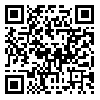BibTeX | RIS | EndNote | Medlars | ProCite | Reference Manager | RefWorks
Send citation to:
URL: http://umj.umsu.ac.ir/article-1-3741-en.html
Background and purpose: One of the most serious problems experienced by adolescents and young adults is the lack of assertive behavior. In order to have an assertive behavior it is necessary for an individual to be aware of self and his/her abilities, and to have an effective perception of the environment. Among the mindfulness training methods, the most common one is the mindfulness-based stress reduction program. The present research aimed to investigate the effects of mindfulness training method based on stress reduction (MBSR), assertiveness increase and anxiety reduction.
Materials and methods: The present research method was a quasi-experimental one with pre-test - post-test control group. The statistical population included female students of Islamic Azad University of Minoodasht county. The statistical sample included 45 persons having low mindfulness, low assertiveness, and high anxiety. Subjects were placed in experimental groups, control and placebo randomly. All of the sample group completed Cattle test anxiety and Gambrel and Ruche assertiveness test in pretest and post-test stages and they completed MAAS attention and awareness scale in pretest stage.
Results: The analysis of data using analysis of covariance and one- way analysis of variance demonstrated that mindfulness method based on stress or anxiety reduction had an impact o
Background & Aims: One of the most serious problems experienced by adolescents and young adults is the lack of assertive behavior. In order to have an assertive behavior it is necessary for an individual to be aware of self and his/her abilities, and to have an effective perception of the environment. Among the mindfulness training methods, the most common one is the mindfulness-based stress reduction program. The present research aimed to investigate the effects of mindfulness training method based on stress reduction (MBSR), assertiveness increasing, and anxiety reduction.
Materials & Methods: The present quasi-experimental study included a pre-test, post-test, and control group. The statistical population included female students of Islamic Azad University of Minoodasht County. The statistical sample included 45 persons having low mindfulness, low assertiveness, and high anxiety. Subjects were placed in experimental groups, control and placebo randomly. All of the sample groups completed Cattle Anxiety Scale and Gambill-Richey Assertiveness Scale in pretest and post-test stages and they completed Mindful Attention Awareness Scale (MAAS) in pretest stage.
Results: The data analysis using covariance and one-way analysis of variance demonstrated that mindfulness method based on stress or anxiety reduction had an impact on increasing assertiveness (F=35.064, P<0.001) and there was a significant difference between mindfulness training and anxiety reduction (F=6.823, P<0.001). Finally, 67% of assertiveness variance is explained by MBSR.
Conclusion: Mindfulness training method had more significant impact on increasing assertiveness and reducing anxiety than control group and placebo.
n increase of assertiveness(F=35.064, P<0.001) and there was a significant difference between mindfulness training and anxiety reduction (F=6.823, P<0.001). Finally, %67 of assertiveness variance is explained by MBSR.
Conclusion: mindfulness training method had more significant impact on increasing assertiveness and reducing anxiety than control group and placebo.
| Rights and permissions | |
 |
This work is licensed under a Creative Commons Attribution-NonCommercial 4.0 International License. |





